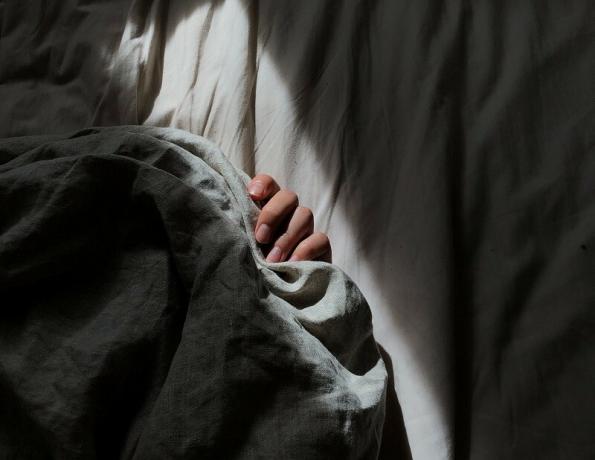The 5 causes of sleep problems in the COVID-19 crisis
For more than a year, the coronavirus crisis has infiltrated all aspects of our lives, both personally and privately as well as professionally and publicly.
What began as a health problem that mainly affected physical health, quickly became also in a social, economic and even political problem with implications in our way of behaving, feeling and to think.
Therefore, it is not surprising that one of the facets of our day-to-day lives in which the pandemic has had a great influence is our ability to sleep well and get enough hours. After all, we dedicate a large part of the day to this activity, and our well-being depends on it. Therefore, in this article we are going to talk about the main causes of sleep problems triggered by the COVID-19 crisis.
- Related article: "The 7 main sleep disorders"
Why is lack of sleep a major psychological problem?
Let's start by clarifying why the impact on sleep quality of a crisis like COVID-19 needs to be taken seriously.
Many people assume that not sleeping well or not sleeping for enough hours creates, at most, a feeling of discomfort that lasts for most of the next day. However, the truth is that
the negative consequences of these kinds of problems go beyond that feeling of discomfort, and have objective implications, not just subjective.The simple fact of sleeping poorly in a single day of rest gives rise to these short-term imbalances:
- Serious difficulties concentrating on tasks, conversations, etc.
- Less ability to memorize and recall memories.
- Greater predisposition to irritability and to react with frustration or anger to unforeseen events.
- Greater predisposition to adopt an attitude of passivity: the person becomes less involved in any action.
Also, if these sleep problems accumulate over the days, other psychological problems appear in the medium and long term. The most significant are the following:
- Increased risk of developing anxiety disorders.
- Increased risk of developing mood disorders.
- The chances of falling into the use of legal or illegal addictive substances are increased.
And, of course, to all this we must add physical health problems, such as a greater predisposition to obesity and cardiovascular diseases, a acceleration of aging, and other alterations that if necessary could even result in death if the situation lasts too long and one falls asleep very little.

- You may be interested in: "Insomnia: what is its impact on our health"
The main causes of sleep problems in the coronavirus pandemic
Obviously, during the coronavirus crisis it is possible to have very diverse sleeping problems, and based on a wide variety of causes. Furthermore, rarely does a psychological problem have only one trigger; you always have to talk about multi-causality.
However, if we focus on the causes of sleep problems characteristic of this era, the following should be highlighted.
1. Anxiety problems based on job and financial insecurity
The economies of many states have staggered greatly during the pandemic, and this has been reflected in the mental health of hundreds of thousands of workers and workers, especially in the case of people in a precarious situation, to whom a dismissal or the closure of a business can get more expensive.
Faced with these kinds of sources of anxiety, it is common to have problems falling asleep, since the brain tends to stay "on track" and with a high level of activation anticipating catastrophic situations and / or seeking urgent solutions.
- Related article: "What is anxiety: how to recognize it and what to do"
2. Rumination due to fear of contagion
The fact that COVID-19 takes several days to generate symptoms makes many people obsess over the idea of having the virus, leading to rumination: the tendency to think over and over again to a type of thought that produces concern. This occurs especially in people with apprehension of diseases and easily suggestible, since that interpret a wide variety of events as a sign or symptom of potentially pathology severe.
3. Depressive symptoms associated with loneliness due to confinement measures
Both the confinement measures applied to the general population and quarantine situations can emotionally overwhelm people, especially the most extroverted. It is not easy to adapt to a routine characterized by the lack of face-to-face contact with others, and this can lead to problems sleeping well.
- You may be interested in: "Types of depression: their symptoms, causes and characteristics"
4. Destructuring of schedules
A change such as going from working in the office to doing it from home can eliminate many temporal references that structured the day-to-day life of the teleworker.
For example, you can fall into the trap of leaving a good part of your homework for the evening, which delays the time to go to sleep (especially if you can't finish on time and try to make up for that by waking up early). In addition, disorganized schedules is also something that in itself affects the quality of sleep, even if the person gets enough hours of sleep.
- Related article: "Time management: 13 tips to take advantage of the hours of the day"
5. Family or grief problems
Finally, the causes of sleep problems may be indirectly facilitated by the pandemic, for the crises that it has been able to generate in the family: arguments at home, sick relatives, death of loved ones, etc.
Looking for psychotherapy services?
If you want to have professional psychological support, get in touch with our team of psychotherapists.
On Psychology 360 we specialize in assisting patients and couples through online video call therapy, at very competitive prices. We tackle issues like anxiety disorders, insomnia, major depression, family crises, low self-esteem, and more.



